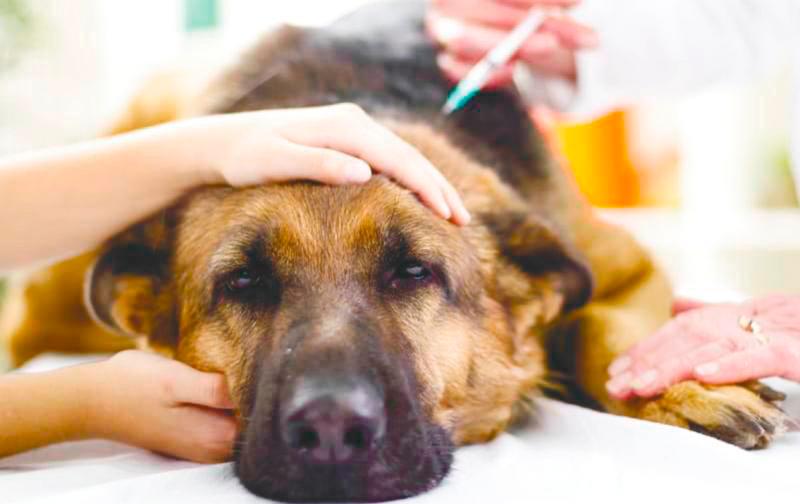VACCINATING your pets protects them from specific diseases.
Vaccines contain weakened or killed organisms that are safe and effective at preventing illness.
The vaccine produces an immune response in your pet, which causes the body to develop antibodies that help fight infection.
They are given to puppies and kittens at six to eight weeks and then again at 12 to 14 weeks.
Annual boosters are then required throughout the lifetime of your pet.
Here are some of the diseases that are preventable through vaccinations:
● Canine Distemper Virus (CDV): This fatal virus attacks a dogs’ respiratory, digestive and nervous systems. Symptoms include fever, cough, diarrhoea, seizures and paralysis. Vaccines can prevent these diseases as there is no cure for CDV. Thus, prevention through vaccination is essential for all dogs.
● Canine Parvovirus (CPV): This virus attacks many organs, including the lungs, gastrointestinal tract, liver and kidneys, resulting in severe vomiting and bloody diarrhoea. There is no cure for CPV, so prevention through vaccination is essential for all dogs.
● Canine Coronavirus: The canine coronavirus is a relatively mild upper respiratory infection affecting dogs of all ages. The disease is transmitted via direct contact with other dogs or by inhalation of infected particles in the air. As no vaccines are available to prevent canine coronavirus infections, vaccinating your dog against this disease
is essential.
●Feline herpesvirus (FHV): This contagious virus causes upper respiratory infections in cats. FHV causes sneezing, a runny nose and conjunctivitis. Many cats have antibodies against FHV, which means they have been exposed to it and produced antibodies to fight it off. But if your cat hasn’t been vaccinated for FHV yet, it could still become ill from the disease.
● Feline Calicivirus (FCV): This virus causes upper respiratory infections in cats. It is spread through contact with infected cats or contaminated objects like bowls or litter boxes. FCV causes sneezing, runny nose and watery eyes similar to those seen with FHV infection. The good news is that most cats have antibodies against FCV, so they can usually fight off an infection without treatment. But if your cat hasn’t been vaccinated yet, it could become ill with FCV too.
● Feline Viral Rhinotracheitis (FVR): This virus causes a highly contagious upper respiratory infection that causes inflammation of the nose, mouth and throat. It can also cause conjunctivitis and upper respiratory distress. FVR is caused by a coronavirus, which spreads quickly through contact with infected cats, kitten litters and contaminated surfaces.
● Feline Panleukopenia: This is the most common and vital vaccine used in feline vaccination programmes. This vaccine is given to cats to protect them against a deadly virus that causes fever, diarrhoea, vomiting and dehydration. It can be hazardous in young kittens and can even cause death.
● Feline leukaemia virus (FeLV): It is a common disease that causes cancer and other health issues in cats. It’s spread through bodily fluids such as blood and saliva. The virus doesn’t survive outside a cat’s body for very long, but it can be transmitted by bites and scratches, especially if they’re deep enough to cause bleeding.
Most pet owners know vaccines can help their pets stay healthy. But did you know that vaccinations also reduce the likelihood of having to make expensive trips to the vet?
Just one visit to a veterinarian can set you back hundreds of ringgit, and if your pet has multiple health issues that number can quickly add up.
You can save money in the long run by keeping your pet’s vaccinations up to date.
Vaccinations are a safe and effective way to protect your pet from diseases that can cause severe illness or even death.
The immune system is like the military that fights off invaders.
They stimulate the immune system to recognise and attack specific viruses or bacteria.
Vaccines also protect you and your family from zoonotic diseases, which are illnesses that can be transmitted between humans and animals.
Rabies is an example of a zoonotic disease that may cause disability or death in humans if not treated quickly after exposure.
Vaccinating your cat or dog is one of the most important things you can do to ensure their long, healthy life.
It’s not only a financial investment for your pet but also a physical one – it’s an investment in their overall health and well-being.
With a few shots under their collar, you can rest easy knowing that your pet is protected from many diseases and ailments.
Dr Thiba Rajoo is a veterinary surgeon at the Ministre of Pets. Comments: letters@thesundaily.com










